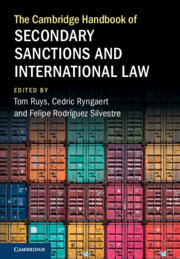Book contents
- The Cambridge Handbook of Secondary Sanctions and International Law
- The Cambridge Handbook of Secondary Sanctions and International Law
- Copyright page
- Contents
- Figures
- Contributors
- 1 Introduction
- Part I Secondary Sanctions
- Part II Secondary Sanctions and General Public International Law
- Part III Secondary Sanctions and International Economic Law
- 11 Secondary Economic Sanctions
- 12 Secondary Sanctions under International Investment Law
- 13 The Enforcement of Extraterritorial Sanctions
- 14 Secondary Sanctions under General and Security Exceptions
- Part IV Secondary Sanctions in Commercial Practices and Domestic Litigation
- Part V The Future of Secondary Sanctions
- Index
14 - Secondary Sanctions under General and Security Exceptions
from Part III - Secondary Sanctions and International Economic Law
Published online by Cambridge University Press: 14 December 2024
- The Cambridge Handbook of Secondary Sanctions and International Law
- The Cambridge Handbook of Secondary Sanctions and International Law
- Copyright page
- Contents
- Figures
- Contributors
- 1 Introduction
- Part I Secondary Sanctions
- Part II Secondary Sanctions and General Public International Law
- Part III Secondary Sanctions and International Economic Law
- 11 Secondary Economic Sanctions
- 12 Secondary Sanctions under International Investment Law
- 13 The Enforcement of Extraterritorial Sanctions
- 14 Secondary Sanctions under General and Security Exceptions
- Part IV Secondary Sanctions in Commercial Practices and Domestic Litigation
- Part V The Future of Secondary Sanctions
- Index
Summary
This chapter considers whether and to what extent secondary sanctions that contravene commitments under trade and investment agreements may be justifiable under security and general exceptions. It analyses the jurisprudence of various international courts and tribunals on the matter, while focusing on the text of General Agreement on Tariffs and Trade (GATT) Articles XX and XXI (which many international economic agreements replicate or adjust). For non-self-judging security exceptions, it concludes, justifiability hinges on the design of sanctions, their targeting of ‘military’ products or services, and the demonstrability of an essential security risk for the sanctioning party. Secondary sanctions might also be justifiable under general exceptions, which feature finer legal criteria to permit measures that pursue legitimate objectives while controlling their abusive application. The chapter considers the enforcement-related exception of GATT Article XX(d), as well as the public morals exception of GATT Article XX(a), which was invoked to justify sanctions in United States – Tariff Measures on Certain Goods from China. As with other measures at the intersection between economic relations and security, the assessment of secondary sanctions under these exceptions becomes particularly challenging in light of their usual objective: restricting trade or investment vis-à-vis specified states, on the basis not of impersonal objectives but of a state’s perception of its essential security interests.
Keywords
- Type
- Chapter
- Information
- Publisher: Cambridge University PressPrint publication year: 2024

